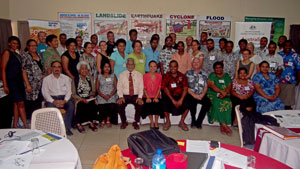A disaster risk management workshop in Suva in mid-November has produced a framework for collaboration to counter the likelihood, reality or consequences of disaster during Fiji's coming six-month cyclone season.
The three-day workshop, convened by the Australian Government-funded Fiji Community Development Program (FCDP), placed civil society organisations (CSOs) at the centre of collaborations with government, donor and humanitarian agencies on disaster risk management.
CSOs play a vital role in disaster preparedness and response, as their direct community links enable them to be first responders post-disaster and the most accessible source of assistance in rural and remote areas.
'This workshop provides a forum for government, civil society organisations and faith-based groups to freely exchange information, successes and challenges and ultimately learn from each other in order to enhance coordination in the ways communities are equipped to prepare for and respond to disasters in Fiji,' said FCDP Team Leader Michael Brownjohn.
But disaster management approaches have been weakened in the past by overlapping services and a lack of coordination between agencies.
'We all know there are tensions between the government and non-government sectors in all societies,' Mr Brownjohn said. 'But when it comes to disasters, we all have one goal in mind and that is to minimise, to the best of our collective ability, harm to people and property.'
Workshop participants conducted mapping and simulation exercises, and discussed the various areas they work in, the services they provide and their disaster response approaches.
CSO participant Pastor Paul Ramswarup commended the opportunity to plan together and share responsibilities before and after disasters in a way that promotes community resilience.
'Often we hear what the government should be doing and what [CSOs] should be doing,' he said. 'We put the fault on leaders, that they do not do enough. We need to take responsibility as individuals and governments. We as individuals need to talk about how we can prepare.'
CSO concerns ranged from psychological counselling to emergency pack distribution, disaster communications, emergency shelter and minimising interruptions to students' schooling.
'It is very important that we empower people in the communities to be prepared mentally,' said Anna Kikun of the Adventist Development Relief Agency (ADRA).
For Bianca Murray of the Access to Quality Education Program (AQEP), an Australian aid initiative supporting primary schools in Fiji's poorest communities, the concern is minimising disruption to students' schooling.
'It's about normalising the situation as quickly as possible for us who work with communities and children, and getting the children back to school as soon as possible,' she said.
Reverend Iliesa Naivalu of the Methodist Church raised the issue of interactive communication for disaster preparedness and response.
'Messages come to people's mobiles when there is a tsunami alert,' he said. 'But is there a way people can call relevant agencies and ask for updates, especially if they do not have radio or mobile access? We need a centre for information.'
Representatives from the National Disaster Management Office (NDMO) and the Fiji Meteorological Services were on hand to inform CSOs of various Disaster Risk Management structures and policies. They shared information on interpreting weather data, as well as methods of community-based disaster risk management.
'We encourage CSOs to give us the information [on] what communities they are working with, as we have a data matrix. Through updating this we can ensure that all affected areas get maximum assistance,' a District Office government official said.
The workshop was an initiative under the Fiji Community Development Program (FCDP), which is an Australian Government-funded program to deliver basic services through civil society organisations to mitigate social and economic hardship for people in Fiji.

